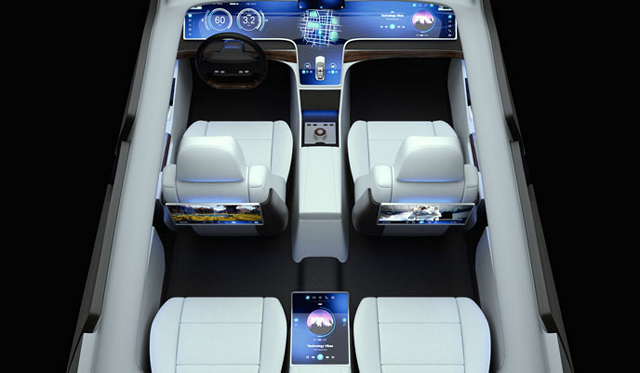
Qualcomm: Automotive pipeline hits US$30bn driven by Snapdragon digital chassis.Source: Qualcomm
Qualcomm: Automotive pipeline hits US$30bn driven by Snapdragon digital chassis
- Qualcomm said its automotive business “pipeline” increased to US$30 billion, thanks to its Snapdragon Digital Chassis. The amount is up more than US$10 billion since its third quarter results were announced in late July.
- The US chip maker currently dominates the automotive connectivity chipset market with more than 80% share.
The automotive industry has been undergoing unprecedented transformation. The rise in electric and autonomous vehicles, led to a growing demand for personalized in-car experiences, and thus the increasing compute power required for connected cars. Riding on this market is Qualcomm with its Snapdragon Digital Chassis, which has granted the US chip maker a US$30 billion worth of pipeline for its automotive business.
To recall, just recently, in late July, Qualcomm during its third quarter results announced that its pipeline stoof at US$20 billion, and in less than three months the amount has increased by US$10 billion. The San Diego-based company attributed the jump in future business to its Snapdragon Digital Chassis product used by car makers and their suppliers.
For context, the Snapdragon Digital Chassis by Qualcomm can provide assisted and autonomous driving technology as well as in-car infotainment and cloud connectivity. Now considering how electric vehicles and autonomous features are increasing in cars, the number of chips used by automakers are also surging. In general, since the pandemic, the automotive market has been a key growth area for chipmakers.
“Qualcomm is a leader in essential technologies for the Connected Intelligent Edge,” said Qualcomm Incorporated’s CEO Cristiano Amon. “Our One Technology Roadmap scales across virtually every industry, including automotive. The Snapdragon Digital Chassis, combined with our relationships with automakers, has resulted in a $30 billion design-win pipeline. We are winning the digital future of automotive.”
On the other hand, Qualcomm’s CFO Akash Palkhiwala shared, “When you think about a per car basis, a lower tier car, we have an opportunity of approximately US$200 stretching all the way to $3,000 at the high tier.” “Going forward, Akash said the mix will continue to shift towards the high end so the opportunity will keep expanding.
In fiscal year 2022, Qualcomm estimates its automotive business revenue will be about US$1.3 billion, from us$975 million the previous year. Then by fiscal year 2026, it estimates that to rise to over US$4 billion and in fiscal year 2031 to over US$9 billion. The automotive market size as a whole could grow to as large as US$100 billion by 2030, Qualcomm predicts.
On that note, according to the latest research from Counterpoint’s Global Automotive NAD Module and Chipset Tracker, global automotive connectivity module and chipset shipments grew by just 3% year-year-year in the first half of 2022. China came out as the largest region as electric vehicle players, including new start-ups such as NIO, Xpeng Motor and Seres, are offering infotainment systems with large displays and smart cockpit solutions that have a wide array of features, and ADAS that requires embedded connectivity.
“But during H1 2022, automotive connectivity module shipments in China declined by almost 7% YoY due to slow car production caused by supply chain disruption and Covid-19 restrictions,” the report claims. In contrast, North America remained more resilient with automotive connectivity module shipments increasing by 27% YoY during the first six months of this year.
The Counterpoint report also noted that Qualcomm holds a dominant position in the chipset market with more than 80% market share. “The strong product portfolio and partnerships with major tier-1 suppliers and automakers are all helping Qualcomm. And now, Qualcomm is offering complete solutions for automotive digital transformation starting with hardware and extending to cloud services with the Snapdragon Digital Chassis. This one-stop solution is helping ecosystem players reduce time to market and be more competitive,” the report stated.
READ MORE
- 3 Steps to Successfully Automate Copilot for Microsoft 365 Implementation
- Trustworthy AI – the Promise of Enterprise-Friendly Generative Machine Learning with Dell and NVIDIA
- Strategies for Democratizing GenAI
- The criticality of endpoint management in cybersecurity and operations
- Ethical AI: The renewed importance of safeguarding data and customer privacy in Generative AI applications


